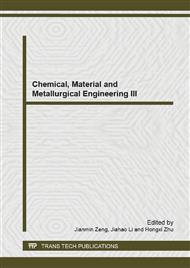p.579
p.584
p.589
p.594
p.598
p.604
p.610
p.617
p.627
Study on Advanced Pretreatment of Seawater by Electrolysis
Abstract:
The advanced pretreatment by electrolysis of Bohai seawater in Tianjin used a diaphragm electrolyzer in the experiment. Removal efficiency and influence factors of the method were analyzed. Results show that turbidity, organic compounds, SDI and chroma of seawater were effectively decreased by electrolysis. Removal efficiency was significantly increased by current density, operation time and inter-electrode distance, and the optimum electrolytic conditions was determined as inter-electrode distance of 2 cm, current density of 15.87 mA·cm-2, operation time of 10 minutes. It was investigated that when the water quality after electrolysis was of pH 8.6, the chroma and turbidity decreasing trend slowed down, with chroma of 0.052 A, removal rate reached 88.4%; the residual turbidity reduced to 2.52 NTU, removal rate reached 90.71%. A PH of about 8.5, CODCr decreasing trend slowed down, and when CODCr < 750 mg/L, it conformed to the requirements of the reverse osmosis water.
Info:
Periodical:
Pages:
598-603
Citation:
Online since:
January 2014
Authors:
Keywords:
Price:
Сopyright:
© 2014 Trans Tech Publications Ltd. All Rights Reserved
Share:
Citation:


